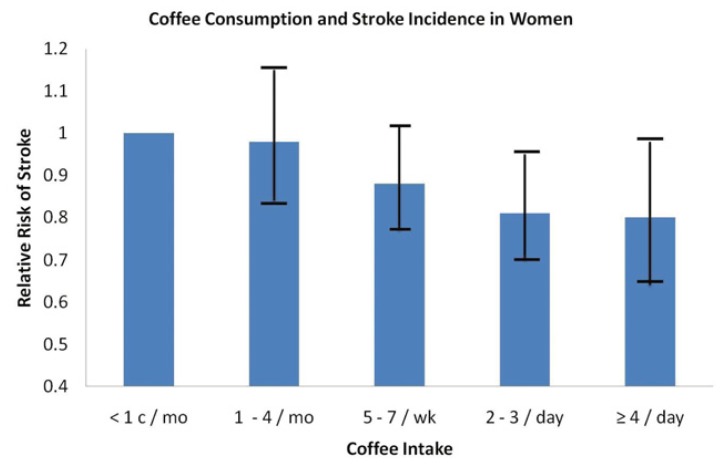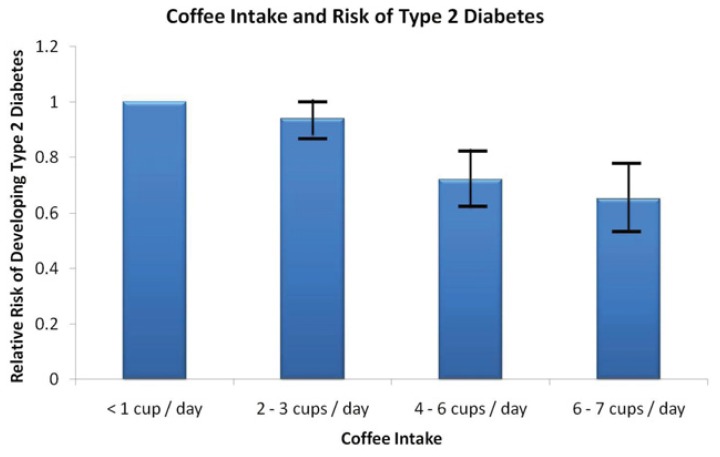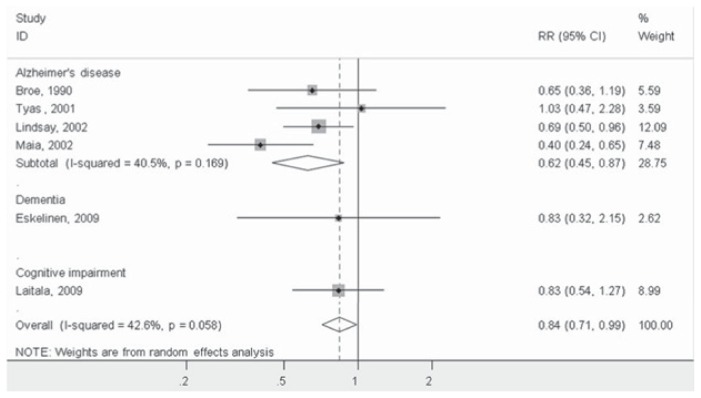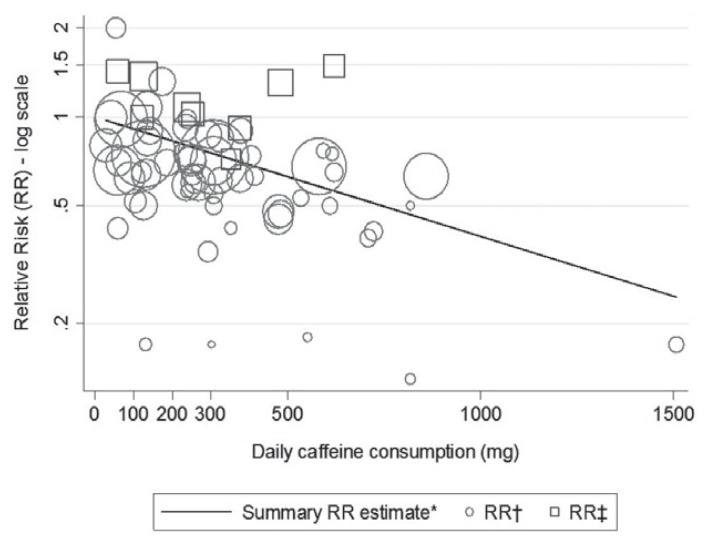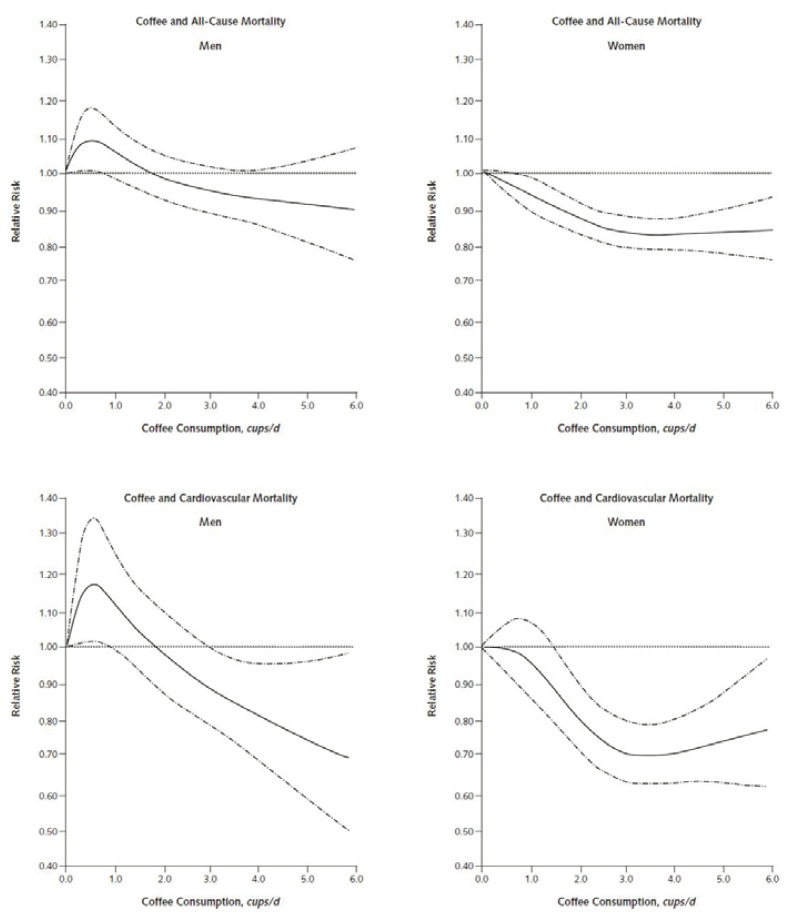Abstract
Caffeine is the most widely consumed psychoactive drug worldwide. Indeed the majority of adults consume caffeine on a daily basis, most commonly in the forms of coffee and tea. Coffee, in particular, is the favored caffeine source in the United States, where more than 150 million people drink coffee on a daily basis. Coffee, one of the richest sources of antioxidants in the average American’s diet, contains caffeine and other antioxidants that have the potential to confer both beneficial and adverse health effects. A growing body of research shows that coffee drinkers, compared to nondrinkers, may be less likely to develop type 2 diabetes, stroke, depression, death from any cause, and neurodegenerative diseases, including Parkinson’s and Alzheimer’s. Coffee appears to have a neutral effect on cardiovascular health. Although more research is clearly needed, coffee, when consumed without added cream or sugar, is a calorie-free beverage that may confer health benefits, especially when used in individuals who do not have adverse subjective effects due to its stimulating effects, and when coffee is substituted for less healthy, unnatural, and/or high-calorie beverages, such as colas and other sugary and artificially sweetened sodas and soft drinks.
Are there ‘grounds’ to recommend coffee consumption?
Recent studies ‘perk’ interest.
Introduction
Coffee is one of the most widely consumed pharmacologically active beverages across the world. Because of the remarkably wide prevalence of daily coffee consumption, even small health effects could have a large impact on public health. Accumulating evidence from recent epidemiological studies suggest that consumption of coffee has been associated with prevention or delay of degenerative diseases including type 2 diabetes mellitus (T2DM), cardiovascular (CV) disease, Parkinson’s disease (PD), Alzheimer’s Disease (AD)1–3, death from any cause, and some cancers.4 These potential benefits have been attributed in part to the antioxidants present in coffee5, moderate weight reduction6,7, increased insulin sensitivity and reduced inflammation8,9 associated with regular coffee consumption. Coffee and tea have been recommended by a United States (US) expert panel consensus statement to be consumed in greater quantities, especially as substitutes for caloric beverages, such as sweetened (with various sugars or artificial sweeteners) nutrient-poor beverages, sports drinks, alcoholic beverages, and even full-fat milk and fruit juices (which are both high in calories).10 However, the specific effects of chronic coffee intake on health, specifically of the heart, blood vessels and brain, remain uncertain? This issue is relevant and important since the majority of adult Americans drink coffee on daily basis. The aim of this review is to discuss the effects of coffee on the CV system and all-cause mortality based on available review of the literature.
Epidemiology
Over 50% of Americans above age 18 drink coffee on a daily basis, and another 30% of the population drinks coffee occasionally; making coffee an important environmental exposure affecting 150 million individuals in the US alone. The average consumption in the US is 3.2 cups of coffee per day; men drink as much coffee as women. The average coffee cup size is 9 oz; 65% of all coffee is consumed during breakfast hours, 30% between meals, and the remaining 5% with other meals. Coffee is one of the world’s most highly valued and traded commodities, accounting for over $70 billion annually in retail sales. The US, where 400 million cups of coffee are consumed every day, is the leading consumer of coffee in the world.11
Coffee Ingredients Relevant to Human Health
Coffee contains over a thousand different biochemical molecules, many formed during the roasting process. Essential compounds found in coffee include: caffeine, diterpene alcohols, chlorogenic acid and other polyphenols. Caffeine is a major component of coffee and its content is highly variable. Coffee provides 71% of the caffeine in the US diet.12 An 8 oz cup of home-prepared brewed coffee (150 ml) contains between 120 and 180 mg of caffeine.13 Specialty coffees consumed in popular US coffee houses typically contain about 160 mg of caffeine per 8 oz but often are served in 12 to 20 oz single-serving containers which will contain approximately 240 to 415 mg of caffeine, respectively. Brewed decaffeinated coffees contain about 5 to 15 mg of caffeine per 8 oz.14 Caffeine exerts its main effects as a potent antagonist of adenosine receptors in the central and peripheral nervous systems, thereby stimulating excitatory neurotransmitters.15 Notable physiological effects associated with caffeine are: central nervous system stimulation, increased metabolic rate, and diuresis; and in a caffeine-naïve person, acute elevation of blood pressure (BP).16
The diterpenoid alcohols are the oils present in coffee that may raise cholesterol; their concentration varies depending on how the coffee is prepared. Filtered coffee has less than 0.1 mg/100 ml, and unfiltered coffee can have between 0.2 and 18 mg/100 ml.12 Boiled coffee has a higher concentration of coffee oils because of the higher temperature used during its preparation, and a longer contact time between the coffee grounds and hot water.17,18 Diterpenoids in unfiltered coffee may raise plasma low-density (LDL) cholesterol and lower high-density (HDL) cholesterol19, but there is also a potentially positive aspect to these coffee oils in that they have been shown to possess anti-carcinogenic properties.20
Coffee is a rich source of polyphenols such as caffeic acid and chlorogenic acid, as well as caffeine; and coffee has been shown to improve adipocyte and liver function. In a randomized controlled trial of 45 middle-aged, non-diabetic, overweight adults, five cups daily of caffeinated coffee raised levels of adiponectin (a hormone that reduces risk for type 2 diabetes and atherosclerosis) and lowered fetuin-A levels, suggesting improved hepatic function.21 These polyphenols also inhibit deoxyribonucleic acid (DNA) methylation in a dose-dependent manner, which prevents down regulation of tumor suppressor proteins and DNA repair enzymes involved in carcinogenesis.22 A 200 ml (7 oz) cup of coffee has been reported to contain 70–350 mg of chlorogenic acid and about 35–175 mg of caffeic acid.23 Coffee also contains several other antioxidants of varying potency may confer beneficial effects.24–26
Unidentified compounds in coffee, other than caffeine, temporarily activate the sympathetic system and may increase blood pressure (BP).27 This effect occurs primarily in non-habitual coffee drinkers, and quickly dissipates with regular coffee consumption. Several micronutrients found in coffee, including magnesium, potassium, niacin, and vitamin E, may contribute to the potential health benefits associated with chronic coffee consumption.
Coffee Consumption and Cardiovascular Risk
Over the past three decades, many epidemiologic studies have extensively examined the cardiovascular risk (CV) effects of coffee consumption, yet the issue remains controversial. Case–control studies have tended to implicate coffee as potentially increasing CV risk, whereas prospective cohort studies have tended to show no associations with coffee intake and CV disease, even among individuals with higher coffee consumption.28,29 A brief review of relevant findings follows.
Coffee and Risk of Coronary Heart Disease
Many studies have evaluated coffee consumption in relation to risk of coronary heart disease (CHD). The Coronary Artery Risk Development in Young Adults (CARDIA)30 was a cohort of 5,115 white and black adults who were aged 18 to 30 years when they completed a baseline clinic examination from 1985 to 1986. Subsequent examinations were conducted 2, 5, 7, 10, 15, and 20 years later. After multivariable adjustment, no association was observed between coronary artery calcification (CAC) or high carotid intima-media thickness and the average consumption (at years 0 and 7) of coffee, decaffeinated coffee, or caffeine. The authors of that study concluded that there is no substantial association between coffee or caffeine intake and coronary and/or carotid atherosclerosis.
A prospective cohort study4 of 3,497 diabetic men without CHD (nonfatal myocardial infarction/MI or fatal CHD) and stroke at baseline, evaluated the risk of CV disease after regular consumption of four cups of coffee. After adjustment for age, smoking, and other CV risk factors, relative risks (RRs) were 0.88 (95% CI 0.50–1.57) for CHD (P for trend = 0.29) and 0.80 (0.41–1.54) for all-cause mortality (p for trend = 0.45) for the consumption of ≥4 cups/d of caffeinated coffee compared with referent values of 1.0 for non-coffee drinkers. Stratification by smoking and duration of diabetes yielded similar results. These data indicated that regular coffee consumption was not associated with increased risk for CHD or mortality in diabetic men.
A meta-analysis of 21 independent prospective cohort studies31 from January 1966 to January 2008 evaluated of the association of CHD with coffee consumption. This analysis did not support the hypothesis that coffee consumption increases the long-term risk of CHD. In this study, 15,599 CHD cases from 407,806 participants were included. As compared to the light coffee consumption (< 1 cup/d in US or ≤2 cups/d in Europe), moderate coffee consumption showed significantly lower CHD (RR 0.82; 0.73–0.92; p < 0.001) in women during the follow up more than 12 years, and of 0.87 (0.80–0.86) (p = 0.001) in men and women followed 10 years or less. Under the random-effects model, the pooled CHD RR for all studies combined were 0.96 (0.87–1.06), 1.04 (0.92–1.17) and 1.07 (0.87–1.32) for the moderate (1–3 or 3–4 cups/d), heavy (4–5 or 5–6 cups/d) and very heavy (≥6 or ≥7 cups/d) categories of coffee consumption (all p > 0.05), respectively.
Effect of Coffee in Established Coronary Heart Disease
A recent analysis of a large cohort of women with established CV disease from the Nurses’ Heart Study found that coffee intake had no effect on either total mortality or CV mortality.32 There was also no association between caffeine intake and either total or cardiovascular mortality. The authors concluded that coffee drinkers who develop heart disease need not discontinue their coffee consumption, as it seems to have no effect on subsequent risk of suffering a fatal event.
Heart rate variability (HRV) is an independent predictor of prognosis in patients who have survived ST-segment elevation myocardial infarct (MI) (STEMI).33,34 Reduction in HRV occurs immediately following an acute MI, can remain suppressed for days to months, and when present predicts a poor CV prognosis.35 A randomized controlled trial36 involving 103 patients with acute STEMI evaluated the effect of acute ingestion of coffee on autonomic function and CV health. These patients randomized to receive regular (caffeinated) or de-caffeinated coffee. In the group randomized to regular coffee, parasympathetic activity increased by up to 96% (p = 0.04) after five days. There was no detrimental effect of regular coffee on cardiac dysrhythmias post -STEMI. The authors concluded that coffee ingestion was associated with an increase in parasympathetic autonomic function immediately post-STEMI and was found to be safe and not associated with adverse CV outcomes during the 12 months of follow up. Additionally, a recent study found that coffee improves endothelial function in patients with CHD as well as in those without CHD. 37
Coffee Consumption and Risk of Heart Failure
A recent prospective, observational study38 of 34,551 participants of the Swedish Mammography Cohort aged 48–83 years females evaluated the relationship between coffee consumption and risk of developing heart failure (HF). Patients included in this study did not have HF, diabetes, or MI at baseline. Over 9 years of follow-up, 602 HF events occurred. Women who consumed ≥5 cups of coffee per day did not have higher rates of HF than those who consumed < 5 cups per day (multivariable-adjusted hazard ratio = 0.93, 95% confidence interval: 0.72–1.20). Further adjustment for self-reported hypertension (HTN) did not change the results. The authors concluded that there was no association between coffee consumption and incidence of HF in middle-aged and older women.
Coffee and Hypertension
HTN is a recognized risk factor for CHD and stroke. It has been well established that acute consumption of caffeine at dietary levels raises BP in caffeine-naïve normotensive and particularly in hypertensive individuals by as much as 10 mm Hg.27,39–41 A 200–250-mg dose of caffeine, equivalent to the amount in 1.5 to 2 cups of coffee, has been found to increase systolic BP by 3–14 mmHg and to increase diastolic BP by 4–13 mmHg in normotensive caffeine-naïve individuals.42 Caffeine can also potentiate (by about 5 to 10 mmHg) the rise in BP induced by stress, such as that occurring in the workplace, but this effect is largely limited to non-habitual (caffeine naïve) coffee drinkers.43,44 It appears that acute effects of caffeine are transient, and that with habitual use (even after just several days of regular consumption) the adverse humoral and hemodynamic effects of caffeine are markedly attenuated.45
The effects of chronic caffeine ingestion, however, are less clear. Coffee intake was not associated with elevated BP or an increased incidence of HTN in several studies.46–49 The Nurses’ Health Study demonstrated that daily intake of up to six cups of coffee or black tea was not associated with an increased risk of HTN.49 However, there is some evidence that chronic caffeine use can cause a small elevation in BP in some individuals.50 A meta-analysis of 18 controlled clinical trials found that coffee ingestion increased systolic and diastolic BP by 1.2 and 0.49 mmHg, respectively.51 Consistent with this observation is that small reductions (about 1 mm Hg) in BP may be seen when habitual coffee drinkers either abstain from coffee or switch to decaffeinated coffee.52,53 A recently published systematic review and meta-analyses of six long-term prospective studies that examined the association of habitual coffee consumption with risk of HTN concluded that habitual coffee consumption of >3 cups/d, was not associated with an increased risk of HTN compared with <1 cup/day; however, a slightly elevated risk appeared to be associated with light-to-moderate consumption of one to three cups/day.54
The effect of coffee may not be solely explained by caffeine. In a study of 15 volunteers (six habitual and nine non-habitual coffee drinkers), intravenous caffeine increased muscle sympathetic nerve activity and BP to a similar degree in both groups.27 Furthermore, non-habitual drinkers had similar elevations in BP and muscle sympathetic nerve activity with caffeinated and decaffeinated coffee.
Coffee and Stroke
Coffee consumption has been inconsistently associated with reductions in stroke incidence and stroke mortality in many studies. Habitual coffee consumption could potentially reduce the risk of stroke by increasing insulin sensitivity55,56 and reducing inflammation.8,9 In a study of Finnish patients with T2DM, those who consumed three or more cups of coffee per day had a statistically non-significant lower risk of death from stroke compared with those who consumed two or fewer cups of coffee per day (RR, 0.73; 95% CI, 0.92 to 1.05).57 Coffee drinking was not associated with risk of total stroke in a cohort of US Health Professionals.58
The Alpha-Tocopherol, Beta-Carotene Cancer Prevention Study59, a prospective cohort study of 26,556 Finnish smoker males aged 50 to 69 years without a history of stroke at baseline, concluded that high consumption of coffee (eight cups/day) may reduce the risk of cerebral infarction among men, independent of known CV risk factors.
A recent prospective epidemiological study60 of Swedish Mammography Cohort investigated the association between coffee consumption and stroke incidence in 34,670 women without a history of CV disease or cancer at baseline who were prospectively followed for mean of 10.4 years. After adjustment for other risk factors, coffee consumption was associated with a statistically significant lower risk of total stroke, cerebral infarction, and subarachnoid hemorrhage but not intracerebral hemorrhage. The association between coffee consumption and cerebral infarction was not modified by smoking status, body mass index, history of diabetes or HTN, or alcohol consumption. An analysis of a prospective group of over 83,000 women from the Nurses’ Health Study who were free of CV disease and cancer at baseline found that coffee consumption was associated with a modest but statistically significant reduction in the risk of stroke during the 24-year follow up period.61 (See Figure 1.)
Figure 1.
Coffee consumption was associated with a significantly reduced risk of stroke in women (p for trend = 0.003) (c = cups of coffee). 61
In contrast, the Honolulu Heart Program with 25 years of follow-up of non-smoking and hypertensive men concluded that the risk of thromboembolic stroke was higher for men who consumed three cups of coffee per day compared to those who consumed no coffee (RR, 2.1; 95% CI, 1.2 to 3.7).62
Coffee and Insulin Resistance
The current literature suggests that antioxidants in coffee (such as chlorogenic acid) may improve glucose metabolism and insulin sensitivity.56 Short-term studies have shown that acute administration of caffeine can induce insulin resistance and impaired glucose tolerance.63,64 However, several prospective long-term studies have shown that consumption of coffee or tea is associated with improved insulin sensitivity and better control of postprandial glycemia in patients with T2DM.55,65,66 A recently publish randomized study found that, consumption of five cups of coffee per day increases adiponectin as compared to no coffee consumption.21 Increase in plasma adiponectin concentration leads to decreased insulin resistance.67 Caffeine acutely activates 5' adenosine monophosphate-activated protein kinase and insulinin-dependent glucose transport in skeletal muscle.68 Long-term caffeine consumption up regulates insulin-like growth factor 1 signaling, that in turn enhances insulin sensitivity as well as insulin secretion in a rat model.69
Coffee and Risk of Developing Type 2 Diabetes Mellitus
Currently available data suggests that long-term coffee consumption is associated with a decreased risk of Type 2 Diabetes Mellitus (T2DM).70–74 (See Figure 2.) Systematic review of nine cohort studies comparing minimal to low coffee consumption (<2 cups/day) to that of >6 cups/day for risk of developing T2DM. The study concluded that the risk of developing T2DM was lowest in subjects who drank >6 cups daily (RR 0.65; 0.54–0.78) and significantly reduced for subjects who consumed four to six cups daily (RR 0.72; 0.62–0.83).75 These associations did not differ by sex, obesity, or region, including the US, Europe, and Asia. A modest inverse association was also seen for decaffeinated coffee.
Figure 2.
Habitual coffee consumption was associated with a dose dependent reduction in risk for development of type 2 diabetes (p for trend < 0.001). 72
The Nurses’ Health Study, a prospective study of over 88,000 women aged 26 to 46 years, found that the risk of T2DM was lower with daily coffee consumption in a dose-dependent fashion, whereby even for small amounts of coffee on a daily basis reduced risk.72 (See Figure 3.) Associations were similar for non-caffeinated and caffeinated coffee; tea consumption did not affect risk of T2DM.
Figure 3.
Caffeine intake was associated with significant reductions in Alzheimer’s disease, dementia, and mild cognitive impairment in this meta-analysis.1
Coffee Consumption and Risk of Arrhythmias
Electrophysiological studies have demonstrated that caffeine might promote arrhythmogenesis. Caffeine can directly increase the trans-membrane calcium current that is responsible for the oscillatory after-potential (i.e. triggered activity) as noted in vitro and in vivo experimental models, in part via release of calcium from the sarcoplasmic reticulum.76–79
A few studies have evaluated the effect of coffee intake on the QT interval and cardiac repolarization. A study of 18 healthy subjects and 18 patients with frequent ventricular ectopic beats reported no significant change in QT interval in either group after caffeine ingestion.47 Another study of 10 healthy volunteers showed that caffeine consumption (400 mg/day, equivalent of four cups of coffee) did not affect the QT interval.80 In addition, experiments with canine ventricular muscle models found no effect of caffeine on cardiac action potentials, which may explain its lack of effect on the QT interval.81
Another study 82 examined 7795 men and women from the Third National Health and Nutrition Survey (NHANES III, 1988–1994). Baseline QT interval was measured from the standard 12-lead electrocardiogram. In the fully adjusted model, the average differences in QT interval comparing participants drinking ≥6 cups/d to those who did not drink any were −1.2 ms (95% CI −4.4 to 2.0) for coffee, and −2.0 ms (−11.2 to 7.3) for tea, respectively. The average difference in QT interval comparing the highest vs. the lowest quartiles of caffeine intake was −1.2 ms (−2.7 to 0.3). The study concluded that QT interval duration was not associated with coffee intake of up to six cups/day does.
In the Women’s Health Study83, 33,638 women > 45 years of age and free of CV disease and AF at baseline were prospectively followed for incident AF from 1993 to March 2009. In this large cohort of initially healthy women, caffeine consumption was not associated with an increased risk of incident AF.
In the Danish Diet84, Cancer, and Health Study 47,949 participants were prospectively followed to determine relationship between caffeine consumption and incidence of atrial fibrillation of flutter. Caffeine was consumed in form of coffee, tea and cola. During follow-up (average 5.7 years), consumption of caffeine was not associated with risk of atrial fibrillation or flutter. Similarly, in a Framingham Heart Study cohort85 consumption of caffeine was not significantly associated with AF risk.
Effect of Coffee Consumption on Lipids
No adverse effects of filtered coffee intake on plasma lipids have been shown by many studies.86,87 The prospective cohort study of over 132,000 men and women (41,736 men in the Health Professionals Follow-Up Study and 86,216 women from the Nurses’ Health Study) found that there was no association between the intake of filtered caffeinated coffee or filtered decaffeinated coffee and serum concentrations of total cholesterol, LDL-cholesterol, or HDL-cholesterol.86 A meta-analysis of 14 randomized controlled trials found that the consumption of boiled coffee dose-dependently increased serum total and LDL-cholesterol concentrations, while the consumption of filtered coffee resulted in very little change in serum cholesterol.88 The cholesterol-raising factors in unfiltered coffee have been identified as cafestol and kahweol, diterpenes that are removed from coffee by paper filters.89
Coffee and Valvular Heart Disease (VHD)
Very limited data has evaluated the impact of coffee consumption and VHD. Cox regression analysis of 1,354 subjects (aged 65.4 to 96.6 years at study entry and then 10-year follow up) from Framingham Heart Study population 90 observed a significant negative association between caffeinated coffee consumption (>1 cup/d) and CHD mortality for subjects with systolic BP <160 mmHg and diastolic BP <100 mmHg. This decreased risk appeared to be caused primarily by an inverse prospective relation between caffeinated coffee consumption and the development or progression of VHD. The study concluded that caffeinated coffee consumption was associated with lower risk of CHD mortality and development or progression of VHD in older Framingham subjects without moderate or severe HTN.
Coffee and Neurodegenerative Disease
Parkinson’s disease
Several studies conducted worldwide have described the relationship between coffee and tea consumption and the risk of developing Parkinson’s disease (PD). Most of these studies found evidence of a dose-response relationship between coffee or tea intake and decreased risk for PD. 91,92 However, heterogeneity and conflicting results between studies preclude a correct estimation of the strength of this association. A recent systematic review and meta-analysis of published cohort, case-control and cross-sectional studies observed an inverse relation between levels of exposure to caffeine and risk of developing PD.2 (See Figure 4.) The RR for the association between caffeine intake and PD was 0.75 [95% CI: 0.68–0.82]. The authors concluded that there was an inverse association between caffeine intake and the risk of PD, which could not be explained by bias or uncontrolled confounding.
Figure 4.
Dose response relation for the association between coffee intake and the risk of Parkinson’s disease. Summary relative risk (RR) estimated by weighted least squares regression. 2
Alzheimer’s Disease
The studies to date addressing this issue suggest that coffee intake may be associated with a reduced risk of Alzheimer’s Disease (AD). In the CAIDE study93, (CV Risk Factors, Aging and Dementia) coffee drinking of three to five cups per day at midlife was associated with a decreased risk of dementia/AD by about 65% at late-life. After an average follow-up of 21 years, coffee drinkers at midlife had lower risk of dementia and AD later in life compared with those drinking no or only little coffee adjusted for demographic, lifestyle and vascular factors, and depressive symptoms.
Additionally, a recent meta-analysis addressing this topic suggested that coffee and caffeine intake may reduce risk of dementia.1 (See Figure 4.) The neuro-protective effect of coffee may be mediated by antioxidant capacity and increased insulin sensitivity.
Coffee Consumption and Depression
Available date suggest that there is a significant inverse association between coffee consumption and depression and/or suicide94–98. A recently published prospective study98 of 50,739 women who were followed for 10 years showed that compared to consuming one or less cup of caffeinated coffee per week, the multivariate relative risk of depression was 0.85 (95% confidence interval, 0.75–0.95) for those consuming two to three cups per day and 0.80 (0.64–0.99; P for trend <.001) for those consuming four cups per day or more. Decaffeinated coffee was not associated with depression risk. Authors concluded that depression risk decreases with increasing caffeinated coffee consumption.
Coffee Consumption and All Cause and CV Mortality
A prospective study, which included the study population of 41,736 men from Health Professionals Follow-Up Study (followed for 18 years) and the Nurses’ Health Study (86,216 women followed for 24 years), assessed the relationship between coffee and all-cause mortality.99 The study showed lower mortality rates during follow up in those who consumed generous amounts of coffee on a daily basis. This study reported that drinking two or more cups of coffee per day was associated with a significant reduction in all-cause mortality in women after multivariable adjustment, primarily due to a reduction in CV mortality. Additionally a strong trend towards a reduction in all-cause mortality was noted in men consuming two or more cups of coffee daily, although it was not statistically significant. Similar findings were noted with decaffeinated coffee, suggesting an effect from a component other than caffeine.99 (See v 5.)
Summary
Currently available data from prospective studies suggests that coffee consumption may decrease the risk of T2DM, and neurodegenerative diseases such as AD and PD. Coffee does not appear to increase the risk of CHD. Coffee consumption could plausibly confer reductions in risks for diabetes, stroke, total mortality, neuro-degenerative diseases, and depression. The precise nature of the relation between coffee and BP is not yet clear, although most evidence suggests that chronic coffee intake does not raise BP to a clinically significant degree, and does not increase risk of development if HTN. Available data suggest that coffee intake of up to 6 cups/day does not affect QT interval or risk of serious dysrhythmias.
The currently available evidence on coffee consumption and risk of CV disease is largely reassuring. The majority of studies also showed that there may be a modest inverse relationship between coffee consumption and all-cause mortality. The observational data do not prove a cause-and- effect relationship, and thus increasing coffee as a prevention strategy cannot currently be recommended. Additional prospective studies on coffee consumption and its effect on the CV system and brain are warranted.
Figure 5.
Relationships between coffee intake and total CV mortality. 93
Biography
Harshal Patil, MD, and James H. O’Keefe, MD, (above) MSMA member since 2003, are at the Mid-America Heart Institute, Saint Luke’s Hospital in Kansas City. Carl J. Lavie, MD, is at the John Ochsner Heart and Vascular Institute, Ochsner Clinical School-The University of Queensland School of Medicine, New Orleans, La. This article marks the first in a two-year Missouri Medicine special series on Preventive Cardiology.
Contact: jhokeefe@cc-pc.com
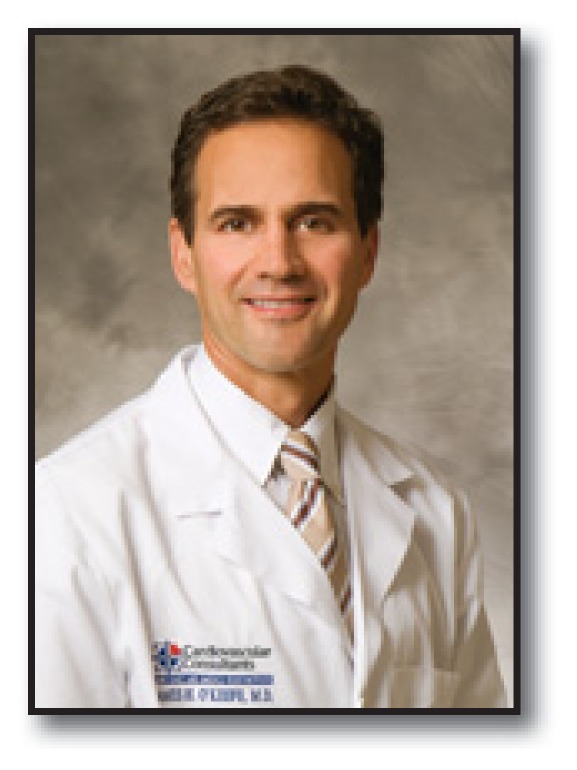
Footnotes
Disclosure
None reported.
Can’t Get Enough Coffee?
Scan code for more on Cuppa Joe on www.Medhelp.org.
See Table of Contents for more directions.
References
The 99 references exceeded space available for publishing. For a copy, email lfleenor@msma.org.



